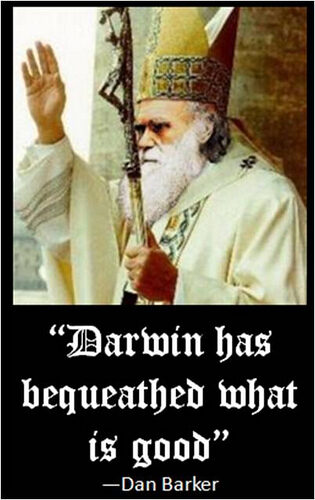Note the words of John Horgan (“Dubitable Darwin? Why Some Smart, Nonreligious People Doubt the Theory of Evolution,” Scientific American, July 6, 2010 AD):
Early in his career, the philosopher Karl Popper (yes, cited by F and P-P) called evolution via natural selection “almost a tautology” and “not a testable scientific theory but a metaphysical research program.” Attacked for these criticisms, Popper took them back. But when I interviewed him in 1992, he blurted out that he still found Darwin’s theory dissatisfying. “One ought to look for alternatives!” Popper exclaimed, banging his kitchen table.
Is it possible that some future genius will discover an alternative that supplants Darwinism as our framework for understanding life? Will we ever look back on Darwin as brilliant but wrong?
Karl Popper was merely one victim of Darwinian orthodoxy’s black listing tactics (see Atheism and “The Wedgie” Document). But, “Is it possible that some future genius will discover an alternative that supplants Darwinism as our framework for understanding life?” Apparently, not if personages such as John Horgan have a say. Note this statement from the very same article:
Darwinism sticks in the craw of some really smart people. I don’t mean intelligent-designers (aka IDiots) and other religious ignorami but knowledgeable scientists and scholars.
Note the childish playground bully tactics and the illogically falsely dichotomous nature of his painting with a broom.

Firstly, he proposes a false dichotomy whereby the juxtaposes, on the one hand, “intelligent-designers (aka IDiots) and other religious ignorami” and, on the other hand, you have “knowledgeable scientists and scholars.” Apparently, the twain shall never meet. This is no less than embarrassing prejudice.
Secondly, note that the hyperlink in the term intelligent-designers leads to an article titled 15 Answers to Creationists. Thus, John Horgan is admitting a lack of knowledge of the issue. There is a very clear distinction between “Creationists” and “Intelligent Design” proponents. If you do not believe it or, if you do not know it, just ask a “Creationists” and an “Intelligent Design” proponent. You can listen to an interview on this topic with Michael Behe at this link.
Thirdly, one evidence of such a distinction is that there are Intelligent Design proponents who are not in the least bit Creationists nor in any way religious. Consider, for example, Francis Crick (the atheist alien directed panspermist) and, David Berlinski (the agnostic).
Fourthly, John Horgan (as well as Richard Dawkins, Mark McPeek and a pantheon of the likeminded) need to understand the history of science. It was “really smart people” who were, nonetheless, “intelligent-designers (aka IDiots)” by any other name, “religious ignorami” by any other name and Creationists by any other name who were, nevertheless, knowledgeable scientists and scholars who established science itself, its methods and fields.
But upon what premise was science itself established? Blind, undirected, unguided, happenstantial, coincidincal appearance from nothing of the universe and life from non life via the chance, time, matter of the gaps? (see, The Gap Filler).
Nay, rather, science itself was established—by “really smart…knowledgeable scientists and scholars”—who believed that a rational God had created the universe and that therefore, God’s creation could be rationally discerned.
Lastly, no one has yet successfully counter argued against Intelligent Design’s primary premise. And, by the way, its primary premise is not, “Well, by golly! That is oh, so complex that, Gooooouuuud must’a’dun’it!” This is what personages such as John Horgan would like you to believe so that they can be seen to defeat what are mere straw theories.
Intelligent Design’s primary premise is that life (and in fact, everything) is based on information and the only known source of information is mind.
This is where Intelligent Design comes to a full stop. It may seek to discern some of the mind’s, the intelligent design’s, characteristics but, in essence, it does not attempt to specifically identify the designer.
To religious ignorami this mind is what we call God.
To Francis Crick it is aliens.
To David Berlinski it is, well, he does not know.
———————- For further reading:
John Horgan and Francis Collins – The Scientist as Believer
Atheism and Science : John Horgan, “In the Beginning…” – Scientific American
